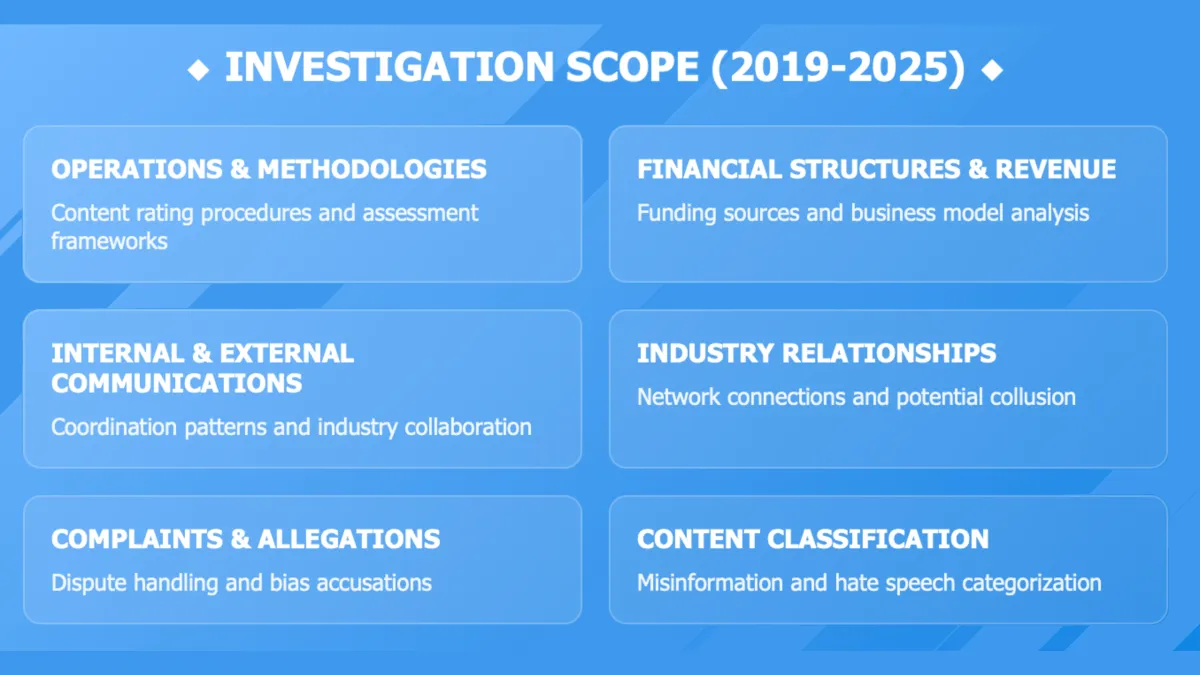
Federal investigators have launched a comprehensive examination of media credibility assessment companies, issuing formal demands for extensive documentation about their business practices and industry connections. The investigation represents the most significant regulatory scrutiny these organizations have faced.
Get the PPC Land newsletter ✉️ for more like this
The Federal Trade Commission distributed Civil Investigative Demand letters to multiple organizations, including Media Matters for America and Ad Fontes Media, according to The New York Times and independently verified by ADWEEK. These legally binding requests function similarly to subpoenas, compelling recipients to produce documents and respond to detailed inquiries about their operations.
One 21-page letter obtained by ADWEEK, dated May 20, demonstrates the investigation's expansive scope. The commission requires organizations to provide comprehensive information spanning from January 1, 2019 to the present, covering operational methodologies, financial structures, internal and external communications, and any complaints or allegations regarding their work.
The government specifically targets relationships between these rating companies and 13 other organizations that track, categorize, evaluate, or rate news sources for misinformation, hate speech, false or deceptive content, or similar categories, according to the letter. This network includes prominent industry players such as NewsGuard, the World Federation of Advertisers, the Interactive Advertising Bureau, DoubleVerify, and Integral Ad Science, alongside watchdog organizations like Check My Ads Institute and the Center for Countering Digital Hate.
Technical demands reveal investigation depth
The commission's requirements extend beyond simple document production. Organizations must conduct searches of all materials within their possession, custody, or control to ensure complete compliance. Recipients face a June 19 deadline to submit requested information and answers, providing them with less than 30 days to compile extensive documentation spanning more than five years of operations.
Vanessa Otero, CEO of Ad Fontes Media, characterized the demands as excessive and overzealous when speaking with ADWEEK. Her company received one of the investigation letters and will comply with the commission's requirements despite concerns about the process.
According to Otero, the requests encompass virtually everything pertinent to their business operations since inception. She emphasized the unusual nature of Civil Investigative Demands, which allow federal agencies including the Department of Justice, FTC, and FCC to conduct pre-litigation investigations without requiring formal charges or lawsuits against the targeted organizations.
"Typically, for a subpoena or a discovery request in a civil trial, parties have to be actually charged with something or actually be sued in order to have to submit to these heavy demands that are very intrusive on your business," Otero explained to ADWEEK. The broad investigative powers available to federal agencies create potentially onerous burdens for companies and can discourage business activities or speech, she noted.
 PPC LandLuis Rijo
PPC LandLuis Rijo
Industry context amplifies investigation significance
This regulatory action occurs against a backdrop of intensified government scrutiny toward the advertising industry. Congressional investigators concluded last year that the Global Alliance for Responsible Media engaged in politically motivated collusion to suppress right-wing media outlets by directing advertising revenue away from platforms including Fox News, Breitbart, and The Daily Wire.
The House Judiciary Committee determined that GARM likely violated federal antitrust laws through these activities. The organization subsequently shuttered operations after facing a lawsuit from X, the social media platform owned by Elon Musk, which accused GARM and its backer, the World Federation of Advertisers, of operating as gatekeepers pressuring brands into boycotts under brand safety pretenses.
Musk has also initiated legal action against Media Matters, alleging that the organization manipulated data to damage X's reputation after publishing research highlighting racist and antisemitic content on the platform. Media Matters responded with its own lawsuit in March, escalating the legal confrontation.
The FTC letter reviewed by ADWEEK originated from the commission's mergers division, prompting speculation about connections to Omnicom's planned acquisition of IPG. The commission issued a second request for information regarding this proposed transaction in March, suggesting potential overlap between investigations.
Marketing industry implications emerge
The investigation carries substantial implications for marketing professionals and advertising decision-makers. Media rating organizations play crucial roles in brand safety determinations, influencing where companies allocate advertising budgets and which platforms receive marketing investments.
These companies provide the infrastructure that enables advertisers to avoid content deemed inappropriate for their brands. Their assessments directly impact revenue flows to media outlets and digital platforms, making their methodologies and potential biases critical factors in the broader media ecosystem.
The scrutiny also reflects ongoing tensions between platform owners, advertisers, and content moderators about acceptable speech standards. Conservative criticism has intensified regarding advertiser decisions to reduce spending on certain platforms, particularly following content moderation controversies.
Industry observers note that regulatory pressure on rating organizations could fundamentally alter how brands approach content association decisions. Companies may need to develop more sophisticated internal assessment capabilities if existing third-party services face operational restrictions or credibility challenges.
The investigation's timing coincides with broader debates about information quality, platform responsibility, and advertiser influence over media content. These discussions have gained prominence as traditional media revenue models face digital disruption and platform-based content consumption increases.
Technical operations under microscope
The commission's demands reveal particular interest in rating methodologies and operational procedures. Organizations must disclose how they categorize content, determine ratings, and communicate findings to clients and the broader industry.
Financial disclosure requirements encompass revenue sources, client relationships, and funding mechanisms. The government seeks to understand how these organizations generate income and whether financial incentives might influence their assessment processes.
Communication records spanning over five years will provide investigators with detailed views of coordination between rating organizations and their industry partners. This documentation could reveal patterns of collaboration or potential conflicts of interest that might affect rating objectivity.
The investigation also examines complaint handling procedures and responses to allegations about rating accuracy or bias. Organizations must provide records of disputes, corrections, and internal discussions about controversial assessments.
Regulatory precedent considerations
Civil Investigative Demands represent powerful investigative tools that allow federal agencies to gather extensive information before formal enforcement actions. The FTC's use of these instruments indicates serious interest in potential regulatory violations within the media rating sector.
Previous antitrust investigations in the advertising industry have resulted in significant organizational changes and operational modifications. The GARM closure demonstrates how regulatory pressure can force industry restructuring even before formal legal conclusions.
Market participants face uncertainty about investigation outcomes and potential regulatory changes. Organizations under scrutiny must balance compliance costs with ongoing business operations while managing reputational risks associated with federal investigation.
The commission's focus on industry relationships suggests concern about coordinated behavior that might restrict competition or manipulate market dynamics. Antitrust enforcement often targets collaborative arrangements that could limit consumer choice or suppress competition.
An FTC spokesperson declined to provide additional information about the investigation, noting that the agency's communications with external parties remain nonpublic. This standard practice maintains investigation integrity while limiting public understanding of regulatory objectives and timelines.
Media Matters confirmed receiving a Civil Investigative Demand and acknowledged being under active FTC investigation. The organization has not provided detailed responses about compliance efforts or investigation scope.
The investigation's resolution could establish important precedents for media rating organization oversight and industry relationship boundaries. Marketing professionals should monitor developments closely as outcomes may significantly impact content assessment practices and advertiser decision-making frameworks.
According to Otero's statement to ADWEEK, businesses maintain rights to avoid advertising alongside content they find objectionable, and no collusion occurs in these decisions. This perspective highlights ongoing debates about legitimate business choices versus potentially coordinated market manipulation.
Timeline
January 1, 2019: Investigation period begins - FTC demands documents from this date forward
2019: GARM established with over 100 members to address harmful content online
July 31, 2021: DoubleVerify introduces Brand Suitability Tiers aligned with GARM standards
March 2024: FTC issues second request regarding Omnicom-IPG acquisition proposal
May 29, 2024: News Media Alliance calls for FTC and DOJ investigation of Google's search practices
August 6, 2024: X files antitrust lawsuit against GARM and major advertisers over alleged illegal boycott
August 8, 2024: World Federation of Advertisers disbands GARM following X's lawsuit
September 21, 2024: FTC report finds social media companies engaged in "vast surveillance" of users
2024: Congressional investigation concludes GARM likely violated antitrust laws through politically motivated media suppression
March 2025: Media Matters files counter-lawsuit against Elon Musk
May 20, 2025: FTC issues Civil Investigative Demand letters to media rating organizations
June 3, 2025: Investigation becomes public through New York Times reporting (4 days ago)
June 19, 2025: Deadline for organizations to submit requested documentation
Present: Organizations including Ad Fontes Media and Media Matters actively complying with FTC demands

